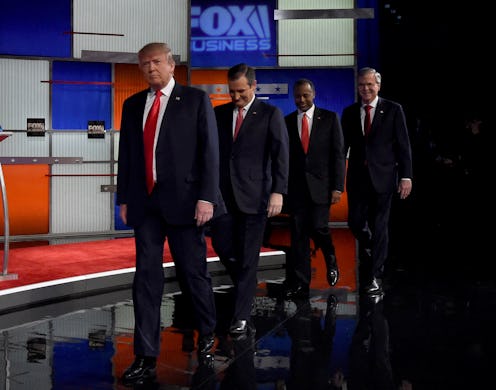News
Ted Cruz Shuts Down Donald Trump's Birther Claim
At the sixth GOP debate on Thursday night, Ted Cruz addressed the birther claim that has been circulated regarding his eligibility to serve as president — and he completely turned the tables on the opponent that's been the loudest in purporting it: Donald Trump. It seemed obvious that Cruz had been waiting for this question to come up. When it did, he had perhaps the best comeback of the night.
For the past several days before Thursday's debate, candidates, members of the media, and pretty much everyone involved in any campaign had been asking whether or not Cruz's Canadian birthplace disqualified him from serving as president. After all, the Constitution states that the president must be a "natural-born" citizen, although the meaning of "natural-born" has several different meanings, depending on whom you ask. There's no denying that Cruz is a U.S. citizen — and has been one from birth — because his mother was an American citizen.
This issue came up minimally when Cruz announced his candidacy back in the spring, but it was quickly dismissed for the most part. At Thursday's debate, moderator Neil Cavuto challenged Cruz to put the issue to bed for good:
That fellow next to you, Donald Trump, and others have said that being born in Canada means you are not natural-born, and that has raised questions about your eligibility. Do you want to try to close this topic once and for all tonight?
Cruz accepted the challenge and triumphed in one fell swoop. Not only did he likely put the issue to bed for good, but he took things a step further by turning Trump into the bad guy — and, potentially, the one ineligible for the White House. But first, Cruz put things into perspective with a comment directed toward Cavuto:
Well, Neil, I'm glad we are focusing on the important topics of the evening.
Once he began to answer the question, Cruz first accused Trump of only bringing up the birther claim against Cruz because of a changing dynamic in the polls. Trump has long led the Republican side of the race, but as of late, Cruz has begun to creep up on him, particularly in the ever-important caucus state of Iowa. In fact, an Iowa poll from earlier this week showed Cruz leading Trump in the state by three points.
You know, back in September, my friend Donald said that he had had his lawyers look a this from every which way, and there was no issue, and there was nothing to this birther issue. Now since September, the Constitution hasn’t changed, but the poll numbers have.
Cruz went on to explain that former candidates for president have been born abroad, yet the natural-born requirement didn't stop them from being eligible for the White House. John McCain, for example, was born in Panama, where his father was stationed as a naval officer. Granted, McCain didn't win election — but it's clear where Cruz was going with this claim.
If these previous defenses were Cruz winning small battles against Trump's birther argument, then his final point was winning the war. Cruz made the argument that under certain birther theories, like those supported by Trump and used by Trump to tear down Cruz, Trump himself might not be eligible to serve as president. Trump himself was born in New York, but his mother was born in Scotland and naturalized as a citizen.
I would note that the birther theories that Donald has been relying on, some of the more extreme ones insist that you must not only be born on U.S. soil, but have two parents born on US soil … under that theory, not only would I be disqualified, Marco Rubio would be disqualified, Bobby Jindal would be disqualified, and interestingly enough, Donald J. Trump would be disqualified.
Trump fired back with, "But I was born here... big difference," but it seemed to be too late — the damage had been done. The crowd erupted in cheers and laughter. Cruz got the last word in, also, by turning things back on the other issues at hand, saying, "You’re an American, as is everybody else on this stage, and I would suggest we focus on who is best prepared to be commander-in-chief."
